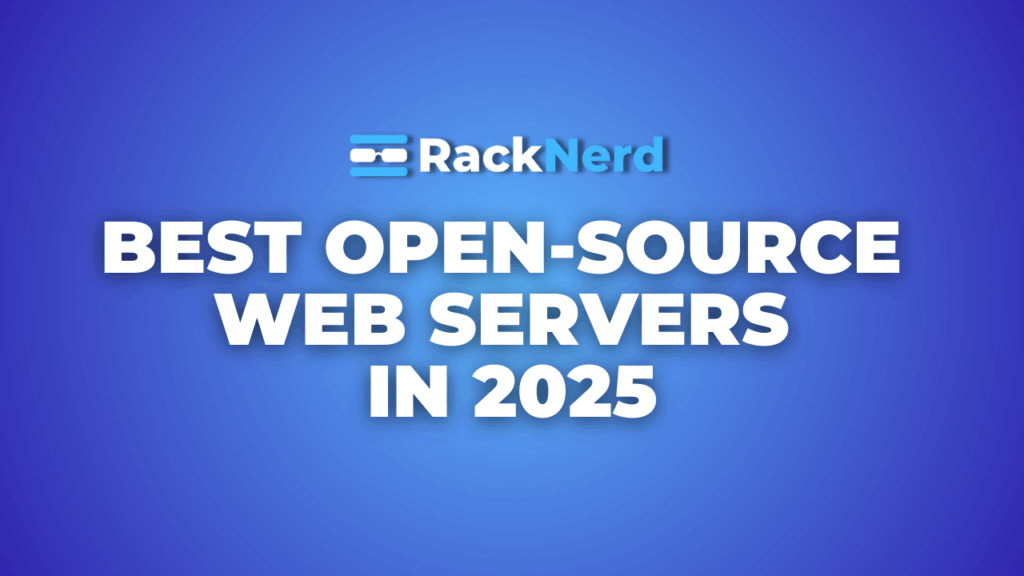Best Open Source Web Servers in 2025

Web servers are essential parts of the internet’s infrastructure in the digital age. They are essential for delivering webpages, responding to browser requests, and guaranteeing smooth
user-application interaction. Because of their openness, flexibility, and community-driven development, open-source web servers have emerged as a key component of this ecosystem. With their unmatched performance, scalability, and innovation, these servers are still at the top of the market in 2024.
This article delves into the top open-source web servers of the year, exploring their unique features, use cases, and the reasons they remain at the forefront of web hosting solutions.
6 Open Source Web Servers in 2025
Apache HTTP Server
Apache HTTP Server, commonly known as Apache, remains a leading choice for web hosting. As one of the oldest web servers, it offers reliability and robust community support.
Key Features:
- Modular architecture for custom configurations.
- Supports dynamic content with modules like mod_php and mod_perl.
- Extensive documentation and active community.
- Compatible with Unix and Windows environments.
Use Cases:
Ideal for small to large websites, including blogs, e-commerce platforms, and enterprise applications.
Advantages
- Customizability: Its modular design allows for highly customized configurations tailored to specific use cases.
- Reliability: Decades of development ensure stability and robust performance.
- Community Support: Backed by one of the largest open-source communities, providing quick resolutions and extensive resources.
- Versatility: Works seamlessly with multiple operating systems and supports numerous programming languages.
Nginx
Nginx, which is pronounced “engine-x,” is praised for its effectiveness and simple handling of several connections at once. Originally created as a remedy for conventional servers’
performance problems, it is now a major component of contemporary web infrastructures. Key Features:
- High performance under heavy loads.
- Built-in reverse proxy and load balancing.
- Supports HTTP/2 and gRPC protocols.
- Event-driven architecture minimizes resource usage.
Use Cases:
Best for high-traffic websites, content delivery networks (CDNs), and applications requiring load balancing.
Advantages
- Scalability: Perfect for high-demand settings, it can effortlessly handle millions of concurrent connections.
- Low Resource Usage: Designed to consume as little memory and CPU as possible, even when traffic is heavy.
- Flexibility: Effectively serves as both a reverse proxy and a web server.
- Cutting-Edge Protocols: Improved compatibility and performance are achieved via native support for gRPC and HTTP/2.
Caddy
Caddy is a contemporary web server that developers and entrepreneurs favour because it places an emphasis on automation and simplicity. It stands out because to its simple setup and native support for HTTPS.
Key Features:
- Automatic HTTPS configuration via Let’s Encrypt.
- Written in Go, ensuring portability and efficiency.
- Extensible through plugins.
- Easy-to-understand configuration file.
Use Cases:
Ideal for developers looking for a modern, hassle-free web server.
Advantages
- Ease of Use: Reduces configuration overhead and makes complicated activities like configuring HTTPS simpler.
- Portability: It runs smoothly on multiple systems and is written in Go.
- Extensibility: Depending on certain requirements, plugins let developers improve functionality.
- Developer-Friendly: Perfect for rapid prototyping and deployment.
LiteSpeed OpenLiteSpeed
OpenLiteSpeed, the open-source brother of LiteSpeed, has strong capabilities for contemporary web applications and is performance-optimized. In the WordPress community, it is very well-known.
Key Features:
- Asynchronous architecture for improved performance.
- Built-in caching solutions (LSCache).
- Supports QUIC and HTTP/3 protocols.
- User-friendly web-based management interface.
Use Cases:
Perfect for WordPress hosting, high-performance websites, and web applications.
Advantages:
- Speed Optimisation: Caching and asynchronous architecture significantly cut down on load times.
- Advanced Protocols: Offers faster and more secure communications by supporting HTTP/3 and QUIC.
- User-Friendly Interface: Administrative activities are made simpler by web-based management.
- WordPress-Friendly: Performance is improved with customised caching techniques.
Lighttpd
Lighttpd is excellent at providing speed and security without sacrificing efficiency because it was created for settings with limited resources. Its lightweight nature makes it ideal for embedded
systems and IoT devices. Key Features:
- Low memory footprint.
- Support for FastCGI, SCGI, and HTTP/2.
- Easy configuration.
- SSL and TLS support.
Use Cases:
Best suited for embedded systems, IoT devices, and minimal-resource environments.
Advantages:
- Resource Efficiency: Performs well in settings with limited memory and CPU.
- Security-focused: Encrypted connections are guaranteed with SSL/TLS support.
- Easy Configuration: A minimal setup that allows for rapid deployment.
- Reliable Performance: Quickly and reliably manages small-scale applications.
H2O
H2O stands out as an advanced web server engineered for modern web standards. For
cutting-edge projects, its focus on speed, security, and protocol support makes it a favourite. Key Features:
- Optimized for HTTP/2 and HTTP/3.
- Supports fast SSL/TLS termination.
- Built-in caching and dynamic content delivery.
Use Cases:
Ideal for the projects that demand advanced performance and comprehensive protocol support.
Advantages:
- High-speed connections are ensured by leading support for HTTP/2 and HTTP/3.
- High Performance: Suitable for real-time services, it is optimised for applications that are sensitive to latency.
- Integrated Features: External plugins are not as necessary thanks to built-in tools.
- Enhanced Security: SSL/TLS encryption is emphasised heavily.
Conclusion
The hosting of websites and apps has been completely transformed by open-source web servers, which provide solutions to meet a variety of requirements. Each server offers something different, from the developer-friendly features of Caddy to the high-performance capabilities of Nginx and the tried-and-true dependability of Apache.
A web server’s scalability, ease of configuration, resource efficiency, and compatibility with contemporary web protocols are all important considerations for developers and organisations. These open-source web servers show that openness, creativity, and community-driven development are essential for being ahead of the curve as the internet develops. Adopting one of these tools guarantees resilience and adaptation for the future in addition to peak performance now.
